CONCEPT 概念的诸多释义
英语常用同义词近义词

英语常用同义词近义词、短语辨析1.idea, concept, conception, thought, notion, impression 这些名词均有“思想、观点、观念”之意。
idea: 最普通常用词,几乎适用于任何方面的思维活动。
concept: 指从众多实例中通过概括、归纳而形成的对事物本质、全貌及其内部联系的概念或看法。
如:A small baby has no concept of right and wrong.婴儿没有是非概念.It was Aristotle who proved the world is round. Plato popularized the concept.亚里士多德证明了地球是圆的,柏拉图普及了这一概念。
conception: (概念、观念、思想)通常指个人或一些人所持有的具体概念或念头,也可指概念的形成过程,含一定的想象和感情色彩意味。
如:He’s got a really strange conception of friendship. 他对友谊有一种非常独特的见解。
ancient Greek thought古希腊思想;lost/deep in thought陷入思索中/在沉思中,如:Derek was staring out of the window, lost in thought. Derek凝视着窗外,陷入了沉思。
thought: 指以推理、思考等智力活动为基础的心理思维活动及其结果。
如:Marxism-Leninism, Mao Zedong Thought, Deng Xiao-ping Theory,“三个代表”之英文表达法——摘自CNN'THE THREE REPRESENTS' Theory first raised by President Jiang Zemin in early 2000.Communist party must:1 - Represent most advanced productive forces, including private business. 代表中国先进社会生产力的发展要求2 - Represent the most advanced culture. 代表中国先进文化的前进方向3 - Represent fundamental interests of the broad masses (i.e. not merely a "revolutionary party" but one that stands for all Chinese.) 代表中国最广大人民的根本利益notion: 尤指错误或模糊的概念、想法;无可靠的基础,未经深思熟虑的观点。
专八常考词汇辨析

八级英语简单同义词近义词、短语辨析idea, concept, conception, thought, notion, impression这些名词均有“思想、观点、观念”之意。
idea: 最普通常用词,几乎适用于任何方面的思维活动。
concept: 指从众多实例中通过概括、归纳而形成的对事物本质、全貌及其内部联系的概念或看法。
conception: 通常指个人或一些人所持有的具体概念或念头,也可指概念的形成过程,含一定的想象和感情色彩意味。
thought: 指以推理、思考等智力活动为基础的心理思维活动及其结果。
notion: 指的是一种模糊的,变化的莫测的想法,无可靠的基础,未经深思熟虑的观点。
impression: 指外部刺激在思想中所产生的印象。
identify, recognize, make out这些动词均含“认出,识别”之意。
identify: 指辨别、确定人的身份或物品的归属等。
recognize: 指所辨认的人或物多是以前所熟悉的。
make out: 通常指通过人的感觉器官来辨别事物。
idle, lazy这两个形容词均有“闲散,懒惰”之意。
idle: 通常指不忙,无事可干,一般不含应责备之意。
lazy: 指好逸恶劳,贪闲偷懒,或不愿学习或工作等,常含应受责备之意。
if, whether这两个连接词均含“是否”之意。
if: 作“是否”解时,多用于口语,引出宾语从句,不能直接跟or not连用。
whether: 多用于书面语中,可与or或or not连用,除引出宾语从句外,还可引出主语从句、表语从句、同位语从句或与不定式连用。
ignorant, illiterate这两个形容词均可表示“无知的”之意。
ignorant: 指一般的无知或指不知道某个具体的事。
illiterate: 指不识字的人或没有文化的人。
ill, sick这两个形容词均有“生病的”之意。
ill: 在英国较常用,指“生病”时,通常作表语,不可作定语。
concept介词搭配
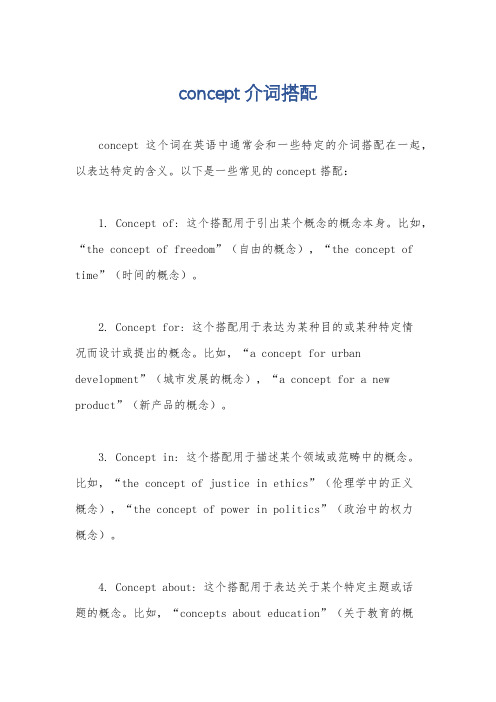
concept介词搭配
concept这个词在英语中通常会和一些特定的介词搭配在一起,以表达特定的含义。
以下是一些常见的concept搭配:
1. Concept of: 这个搭配用于引出某个概念的概念本身。
比如,“the concept of freedom”(自由的概念),“the concept of time”(时间的概念)。
2. Concept for: 这个搭配用于表达为某种目的或某种特定情
况而设计或提出的概念。
比如,“a concept for urban development”(城市发展的概念),“a concept for a new product”(新产品的概念)。
3. Concept in: 这个搭配用于描述某个领域或范畴中的概念。
比如,“the concept of justice in ethics”(伦理学中的正义
概念),“the concept of power in politics”(政治中的权力
概念)。
4. Concept about: 这个搭配用于表达关于某个特定主题或话
题的概念。
比如,“concepts about education”(关于教育的概
念),“concepts about love and relationships”(关于爱和人际关系的概念)。
这些是一些常见的concept搭配,它们可以帮助我们更准确地表达和理解各种概念。
希望这些解释能够帮到你。
concept是什么意思 concept+conception含义及用法区别
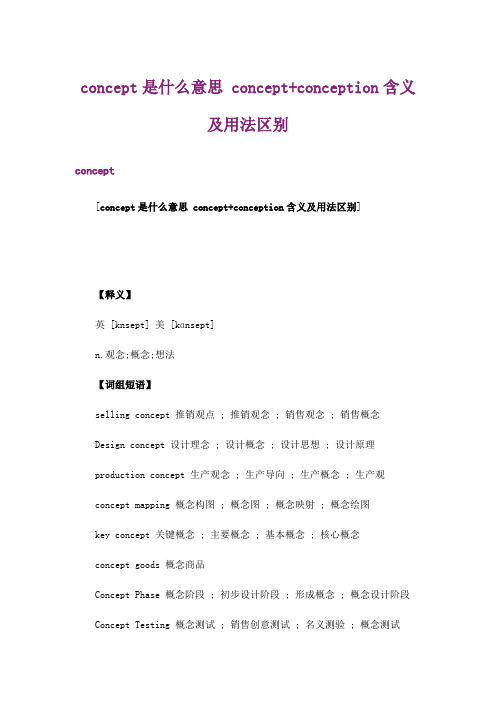
concept是什么意思 concept+conception含义
及用法区别
concept
[concept是什么意思 concept+conception含义及用法区别]
【释义】
英 [knsept] 美 [kɑnsept]
n.观念;概念;想法
【词组短语】
selling concept 推销观点 ; 推销观念 ; 销售观念 ; 销售概念
Design concept 设计理念 ; 设计概念 ; 设计思想 ; 设计原理
production concept 生产观念 ; 生产导向 ; 生产概念 ; 生产观
concept mapping 概念构图 ; 概念图 ; 概念映射 ; 概念绘图
key concept 关键概念 ; 主要概念 ; 基本概念 ; 核心概念
concept goods 概念商品
Concept Phase 概念阶段 ; 初步设计阶段 ; 形成概念 ; 概念设计阶段Concept Testing 概念测试 ; 销售创意测试 ; 名义测验 ; 概念测试
Concept Store 概念店 ; 并积极发展 ; 品牌观点店 ; 概念店
【词义辨析】
1. idea,concept,conception,thought,notion,impression
这些名词均有“思想、观点、观念”之意。
idea最普通常用词,几乎适用于任何方面的思维活动。
concept指从众多实例中通过概括、归纳而形成的对事物本质、全貌及其内部联系的概念或看法。
Concept概念

1.Concept概念A generalized idea that represents something of meaning.廣義的理念,代表意義的東西。
2.Operationalization開始運作The process of identifying scales that correspond to variance in a concept to be involved in a research process.確定與方差在參與研究過程的概念相對應的尺度的過程。
3.Scales尺度A device providing a range of values that correspond to different values in aconcept being measured.一種設備,提供不同的值,在被測的概念相對應的值的範圍。
4.Correspondence rules對應規律Indicate the way that a certain value on a scale corresponds to some true value of a concept.指示在規模上的某些值對應于一個概念的一些真正價值的方式。
5.Construct構建A term used to refer to concepts measured with multiple variables.一詞的概念,請參閱用於測量多個變數。
Nominal, Ordinal, Interval, and Ratio Scales provide Different information.名義,序號、間隔和比例尺度提供不同的資訊。
6.Nominal Scales名義尺度Represent the most elementary level of measurement in which values areassigned to an object for identification or classification purposes only.代表最基本測量值指派給一個物件,用於識別或分類的目的只在其中的級別。
CONCEPT概念的诸多释义

CONCEPT概念的诸多释义ConceptA.From WikipediaA concept is an abstraction or generalisation from experience or the result of a transformation of existing ideas.The concept is instantiated(reified)by all of its actual or potential instances,whether these are things in the real world or other ideas. Concepts are treated in many if not most disciplines both explicitly,such asin linguistics,psychology,philosophy,etc.,and implicitly,such asin mathematics,physics,etc.In informal use the word concept often just meansany idea,but formally it involves the abstraction component.When the mind makes a generalization such as the concept of tree,it extractssimilarities from numerous examples;the simplification enables higher-levelthinking.In metaphysics,and especially ontology,a concept is a fundamental category of existence.In contemporary philosophy,there are at least three prevailing ways to understand what a concept is:Concepts as mental representations,where concepts are entities that exist in the brain(mental objects)Concepts as abilities,where concepts are abilities peculiar to cognitive agents (mental states)Concepts as Fregean senses(see sense and reference),where concepts are abstract objects,as opposed to mental objects and mental states Embodied contentMain article:Embodied cognitionIn cognitive linguistics,abstract concepts are transformations of concrete concepts derived from embodied experience.The mechanism of transformation is structural mapping,in which properties of two or more source domains are selectively mapped onto a blended space(Fauconnier&Turner,1995;see conceptual blending).A common class of blends are metaphors.Abstract objectsMain article:Abstract objectIn a platonist theory of mind,concepts are construed as abstract objects.This debate concerns the ontological status of concepts–what they are really like.In the simplest terms,a concept is a name or label that regards or treats an abstraction as if it had concrete or material existence.I t is important to realizethat a concept is merely a symbol,a representation of the abstraction.The word is not to be mistaken for the thing.For example,the word"moon"(a concept)is not the large,bright,shape-changing object up in the sky,but only represents that celestial object.Concepts are created(named)to describe,explain and capture reality as it is known and understood.A priori conceptsMain articles:A priori and a posteriori and Category(Kant)Kant declared that human minds possess pure or a priori concepts.Instead of being abstracted from individual perceptions,like empirical concepts,they originate in the mind itself.He called these concepts categories,in the sense of the word that means predicate,attribute,characteristic,or quality.But these pure categories are predicates of things in general,not of a particular thing.He called those concepts that result from abstraction"a posteriori concepts"(meaning concepts that arise out of experience).An empirical or an a posteriori concept is a general representation (Vorstellung)or non-specific thought ofthat which is common to several specific perceived objects(Logic,I,1.,§1,Note1)A concept is a common feature or characteristic.Kant investigated the way that empirical a posteriori concepts are created. The logical acts of the understanding by which concepts are generatedas to their form are:/doc/00c369d732d4b14e852458fb770bf78a65293a00.html parison,i.e.,the likening of mental images to one another inrelation to the unity of consciousness;2.reflection,i.e.,the going back over different mental images,howthey can be comprehended in one consciousness;and finally3.abstraction or the segregation of everything else by which themental images differ...In order to make our mental images into concepts,onemust thus be able to compare,reflect,and abstract,forthese three logical operations of the understanding areessential and general conditions of generating anyconcept whatever.OntologyMain article:OntologyPlato was the starkest proponent of the realist thesis of universal concepts.By his view,concepts(and ideas in general)are innate ideas that were instantiations of a transcendental world of pure forms that lay behind the veil of the physical world.In this way,universals were explained as transcendent objects.Main article:Mental representationIn a physicalist theory of mind,a concept is a mental representation,which the brain uses to denote a class of things in the world.This is to say that it is literally,a symbol or group of symbols together made from the physical material of the brain. Concepts are mental representations that allow us to draw appropriate inferences about the type of entities we encounter in our everyday lives.Concepts do not encompass all mental representations,but are merely a subset of them.The use of concepts is necessary to cognitive processes suchas categorization,memory,decision making,learning,and inference.Classical theoryMain article:DefinitionismThe classical theory of concepts,also referred to as the empiricist theory of concepts, is the oldest theory about the structure of concepts(it can be traced back to Aristotle), and was prominently held until the1970s.The classical theory of concepts says that concepts have a definitional structure.Adequate definitions of the kind required by this theory usually take the form of a list of features.These features must have two important qualities to provide a comprehensive definition.Features entailed by the definition of a concept must be both necessary and sufficient for membership in the class of things covered by a particular concept.A feature is considered necessary if every member of the denoted class has that feature.A feature is considered sufficient if something has all the parts required by the definition.Another key part of this theory is that it obeys the law of the excluded middle,which means that there are no partial members of a class,you are either in or out.Prototype theoryMain article:Prototype theoryPrototype theory says that concepts specify properties that members of a class tend to possess,rather than must possess.Wittgenstein describes the relationship between members of a class as family resemblances.There are not necessarily any necessary conditions for membership,a dog can still be a dog with only three legs. This view is particularly supported by psychological experimental evidence for prototypicality effects.We can judge an item's membership to the referent class of a concept by comparing it to the typical member–the most central member of the concept.If it is similar enough in the relevant ways,it will be cognitively admitted as a member of the relevant class of entities.Rosch suggests that every category is represented by a central exemplar which embodies all or the maximum possible number of features of a given category.Theory-theoryThis theory postulates that categorization by concepts is something like scientific theorizing.Concepts are not learned in isolation,but rather are learned as a part of ourexperiences with the world around us.In this sense,concepts'structure relies on their relationships to other concepts as mandated by a particular mental theory about the state of the world.According to the theory of ideasthesia(or"sensing concepts"),activation of a concept may be the main mechanism responsible for creation of phenomenal experiences.Therefore,understanding how the brain processes concepts may be central to solving the mystery of how conscious experiences(or qualia)emerge within a physical system e.g.,the sourness of the sour taste of lemon.This question is also known as the hard problem of consciousness.Research on ideasthesia emerged from research on synesthesia where it was noted that a synesthetic experience requires first an activation of a concept of the /doc/00c369d732d4b14e852458fb770bf78a65293a00.html ter research expanded these results into everyday perception.B.From Sci-tech encyclopediaConcept1.International Dictionary of Psychoanalysis|2005|Luzes,PedroCOPYRIGHT2005Thomson Gale.For Wilfred Bion,conception is the result of coupling a pre-conception,an innate a priori idea,and a realization,elements of the real that are provided by external-sensory or internal-emotional experience.The concept is derived from conception through abstraction and /doc/00c369d732d4b14e852458fb770bf78a65293a00.html nguage and the attribution of a name to a concept unite preconception and realization,preventing any loss of experience in the process.Bion considers the concept a conception that has been assigned a name.The concept signifies a growth of the abstraction that enables us to expand the generalization of psychoanalytic theories,which,as a whole are judged to be too descriptive,tooconcrete.Concepts can be articulated in a deductive scientific system that functions like an Ars combinatoria2.The Oxford Pocket Dictionary of Current English|2009The Oxford Pocket Dictionary of Current English2009,originally published by Oxford University Press2009.con·cept/?k?n?sept/?n.an abstract idea;a general notion:the concept of justice.?a plan or intention;a conception:the center has kept firmly to its originalconcept.?an idea or invention to help sell or publicize a commodity:a new concept in corporate hospitality.?Philos.an idea or mental picture of a group or class of objects formed by combining all their aspects.?[as adj.](of a car or other vehicle) produced as an experimental model to test the viability of new design features.C.British Dictionary definitions for conceptnoun1.an idea,esp an abstract idea:the concepts of biology2.(philosophy)a general idea or notion that corresponds to some class of entities andthat consists of the characteristic or essential features of the class3.(philosophy)a.the conjunction of all the characteristic features of somethingb.a theoretical construct within some theoryc.a directly intuited object of thoughtd.the meaning of a predicate4.(modifier)(of a product,esp a car)created as an exercise to demonstrate thetechnical skills and imagination of the designers,and not intended for massproduction or saleWord Origin and History for conceptn.1550s,from Medieval Latin conceptum"draft,abstract,"in classical Latin"(a thing) conceived,"from concep-,past participle stem of concipere"to take in"(see conceive).In some16c.cases a refashioning of conceit(perhaps to avoidnegative connotations).D.From Britannica encylopedia1.concept,in the Analytic school of philosophy,the subject matter of philosophy,which philosophers of the Analytic school hold to be concerned with the salientfeatures of the language in which people speak of concepts at issue.Concepts are thus logical,not mental,entities.A typical instance of the use of concept is in The Concept of Mind(1949)by Gilbert Ryle,an Oxford Analyst,which implies that the purpose of the author is not to investigate matters of fact empirically(i.e.,by themethods of psychology)about the mind itself but to investigate its“logicalgeography.”Similarly,investigation...(100of138words)DictionarytheA semanticallyF.From Collins English Dictionarynoun1.an idea,esp an abstract idea?the concepts of biology2.philosophy a general idea or notion that corresponds to some class of entities and that consists of the characteristic oressential features of the class3.philosophy a.the conjunction of all the characteristic features of somethingb.a theoretical construct within some theoryc.a directly intuited object of thoughtd.the meaning of a predicate4.(modifier)(of a product,esp a car)created as an exercise to demonstrate the technical skills and imagination of thedesigners,and not intended for mass production or sale.。
同义词辨析
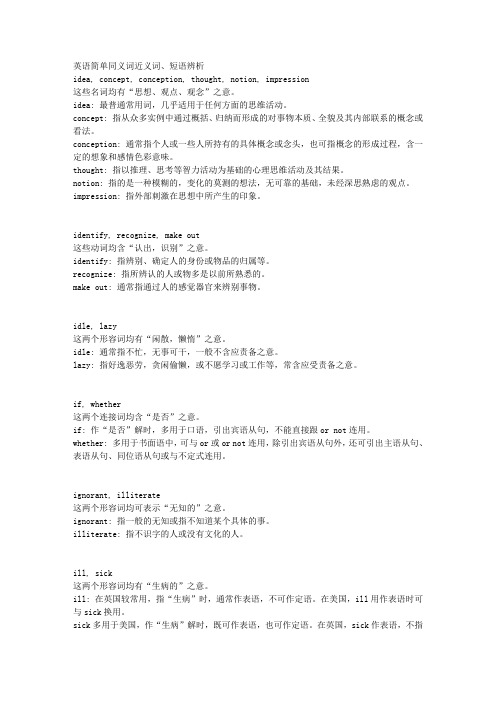
英语简单同义词近义词、短语辨析idea, concept, conception, thought, notion, impression这些名词均有“思想、观点、观念”之意。
idea: 最普通常用词,几乎适用于任何方面的思维活动。
concept: 指从众多实例中通过概括、归纳而形成的对事物本质、全貌及其内部联系的概念或看法。
conception: 通常指个人或一些人所持有的具体概念或念头,也可指概念的形成过程,含一定的想象和感情色彩意味。
thought: 指以推理、思考等智力活动为基础的心理思维活动及其结果。
notion: 指的是一种模糊的,变化的莫测的想法,无可靠的基础,未经深思熟虑的观点。
impression: 指外部刺激在思想中所产生的印象。
identify, recognize, make out这些动词均含“认出,识别”之意。
identify: 指辨别、确定人的身份或物品的归属等。
recognize: 指所辨认的人或物多是以前所熟悉的。
make out: 通常指通过人的感觉器官来辨别事物。
idle, lazy这两个形容词均有“闲散,懒惰”之意。
idle: 通常指不忙,无事可干,一般不含应责备之意。
lazy: 指好逸恶劳,贪闲偷懒,或不愿学习或工作等,常含应受责备之意。
if, whether这两个连接词均含“是否”之意。
if: 作“是否”解时,多用于口语,引出宾语从句,不能直接跟or not连用。
whether: 多用于书面语中,可与or或or not连用,除引出宾语从句外,还可引出主语从句、表语从句、同位语从句或与不定式连用。
ignorant, illiterate这两个形容词均可表示“无知的”之意。
ignorant: 指一般的无知或指不知道某个具体的事。
illiterate: 指不识字的人或没有文化的人。
ill, sick这两个形容词均有“生病的”之意。
ill: 在英国较常用,指“生病”时,通常作表语,不可作定语。
专业英语16课翻译-推荐下载
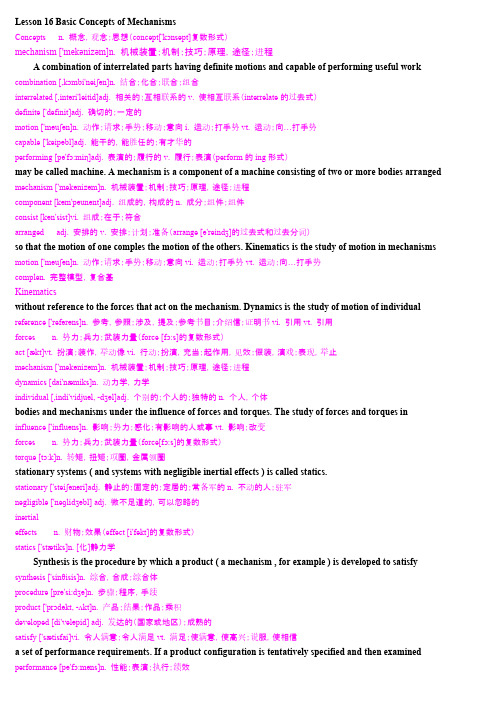
Lesson 16 Basic Concepts of MechanismsConcepts n. 概念,观念;思想(concept['kɔnsept]复数形式)mechanism ['mekənizəm]n. 机械装置;机制;技巧;原理,途径;进程A combination of interrelated parts having definite motions and capable of performing useful work combination [,kɔmbi'neiʃən]n. 结合;化合;联合;组合interrelated [,intəri'leitid]adj. 相关的;互相联系的v. 使相互联系(interrelate的过去式)definite ['definit]adj. 确切的;一定的motion ['məuʃən]n. 动作;请求;手势;移动;意向i. 运动;打手势vt. 运动;向…打手势capable ['keipəbl]adj. 能干的,能胜任的;有才华的performing [pə'fɔ:miŋ]adj. 表演的;履行的v. 履行;表演(perform的ing形式)may be called machine. A mechanism is a component of a machine consisting of two or more bodies arranged mechanism ['mekənizəm]n. 机械装置;机制;技巧;原理,途径;进程component [kəm'pəunənt]adj. 组成的,构成的n. 成分;组件;组件consist [kən'sist]vi. 组成;在于;符合arranged adj. 安排的v. 安排;计划;准备(arrange [ə'reindʒ]的过去式和过去分词)so that the motion of one comples the motion of the others. Kinematics is the study of motion in mechanisms motion ['məuʃən]n. 动作;请求;手势;移动;意向vi. 运动;打手势vt. 运动;向…打手势complen. 完整模型,复合基Kinematicswithout reference to the forces that act on the mechanism. Dynamics is the study of motion of individual reference ['refərəns]n. 参考,参照;涉及,提及;参考书目;介绍信;证明书vi. 引用vt. 引用forces n. 势力;兵力;武装力量(force[fɔ:s]的复数形式)act [ækt]vt. 扮演;装作,举动像vi. 行动;扮演,充当;起作用,见效;假装,演戏;表现,举止mechanism ['mekənizəm]n. 机械装置;机制;技巧;原理,途径;进程dynamics [dai'næmiks]n. 动力学,力学individual [,indi'vidjuəl, -dʒəl]adj. 个别的;个人的;独特的n. 个人,个体bodies and mechanisms under the influence of forces and torques. The study of forces and torques in influence ['influəns]n. 影响;势力;感化;有影响的人或事vt. 影响;改变forces n. 势力;兵力;武装力量(force[fɔ:s]的复数形式)torque [tɔ:k]n. 转矩,扭矩;项圈,金属领圈stationary systems ( and systems with negligible inertial effects ) is called statics.stationary ['steiʃənəri]adj. 静止的;固定的;定居的;常备军的n. 不动的人;驻军negligible ['neɡlidʒəbl] adj. 微不足道的,可以忽略的inertialeffects n. 财物;效果(effect [i'fekt]的复数形式)statics ['stætiks]n. [化]静力学Synthesis is the procedure by which a product ( a mechanism , for example ) is developed to satisfy synthesis ['sinθisis]n.综合,合成;综合体procedure [prə'si:dʒə]n.步骤;程序,手续product ['prɔdəkt,-ʌkt]n.产品;结果;作品;乘积developed [di'veləpid] adj. 发达的(国家或地区);成熟的satisfy ['sætisfai]vi. 令人满意;令人满足vt. 满足;使满意,使高兴;说服,使相信a set of performance requirements. If a product configuration is tentatively specified and then examined performance [pə'fɔ:məns]n.性能;表演;执行;绩效requirements n. 调整需要量,必需品;要求(requirement [ri'kwaiəmənt]的复数)configuration [kən,fiɡju'reiʃən]n.配置;结构;外形tentative ['tentətiv]adj.试验性的,暂定的;踌躇的n. 假设,试验specified adj. 规定的;详细说明的v. 指定;详细说明(specify['spesəfai, -si-]的过去分词)examined adj. 验讫;检查过的v. 检查;调查(examine[iɡ'zæmin]的过去式)to determine whether the performance requirements are met , the process is called analysis.The design determine [di'tə:min]vt.决定;使…下定决心;判决vi. 决定;确定;判决,终止performance [pə'fɔ:məns]n.性能;表演;执行;绩效requirements n. 调整需要量,必需品;要求(requirement [ri'kwaiəmənt]的复数)process ['prəuses,'prɔ-]vt.处理;加工n.过程,进行;方法,步骤;作用;程序;推移adj.经过特殊加工(或处理)的analysis [ə'næləsis]n.分析;分解;验定design [di'zain]vt. 设计;计划;构思n. 设计;图案vi. 设计of mechanisms involves both synthesis and analysis.mechanism ['mekənizəm]n.机械装置;机制;技巧;原理,途径;进程involves v. 包含;牵涉(involve [in'vɔlv]的第三人称单数形式)synthesis ['sinθisis]n.综合,合成;综合体analysis [ə'næləsis]n.分析;分解;验定The design process begins with the recognition of a need. A set of requirements is then listed. Detailed process ['prəuses,'prɔ-]vt.处理;加工n.过程,进行;方法,步骤;作用;程序;推移adj.经过特殊加工(或处理)的begin [bi'ɡin]vt.开始vi. 开始;首先recognition [,rekəg'niʃən]n.承认,认出;赞誉;重视;识别;公认set [set]n. 集合;一套;布景;装置;趋势vt. 树立;点燃;放;点缀;使凝结vi. 凝固;结果;定型requirements n. 调整需要量,必需品;要求(requirement[ri'kwaiəmənt]的复数)listed ['listid]adj. 列出的;已登录的;表列的v. 列出;登记(list的过去分词)detailed ['di:teild, di'teild]adj. 详细的,精细的;复杂的,详尽的v. 详细说明(detail的过去分词)analyses of displacements, velocities , and accelerations are usually required. This part of the design displacement [dis'pleismənt]n.取代,移位;排水量velocity [vi'lɔsəti]n.速率;迅速;周转率acceleration [ək,selə'reiʃən]n. 加速,促进;加速度usually adv. 通常,经常required [ri'kwaiəd]adj.必需的;(美)必修的v. 要求;需要(require的过去式及过去分词形式)process is followed by an analysis of forces and torques. The design process may continue long after process ['prəuses,'prɔ-]vt.处理;加工n.过程,进行;方法,步骤;作用;程序;推移adj.经过特殊加工(或处理)的torque [tɔ:k] Nn. 转矩,扭矩;项圈,金属领圈continue [kən'tinju:]vi.仍旧,连续;继续,延续vt. 继续说…;使…继续;使…延长the first models have been produced and may include redesigns of components that affect velocities, model ['mɔdəl]n.模型;模范;模特儿;典型;样式vt. 模仿;模拟;塑造vi.做模特儿;做模型adj. 模范的;作模型用的produced [prəu'dju:st]v.创作;产生;制造(produce的过去式和过去分词)adj. 引长的;畸形地伸长的include [in'klu:d] vt. 包含,包括redesign [,ri:di'zain]vt. 重新设计n. 新设计;重新设计components n. 部件;组件;成份(component[kəm'pəunənt]复数)affect [ə'fekt, 'æfekt]vt. 影响;假装;感动;感染vi. 倾向;喜欢n. 情感;引起感情的因素velocity [vi'lɔsəti]n.速率;迅速;周转率accelerations, forces, and torques. In order to successfully compete from year to year, most manufacturers acceleration [ək,selə'reiʃən]n.加速,促进;加速度torque [tɔ:k] n. 转矩,扭矩;项圈,金属领圈order ['ɔ:də]n.命令;顺序;定单;规则vt. 命令;定购;整理vi. 命令;定货successfully adv. 顺利地;成功地(success [sək'ses] fully ['fuli])compete [kəm'pi:t] vi. 竞争;比赛;对抗manufacturers n. 制造商;厂商(manufacturer [,mænju'fæktʃərə])must continuously modify their product and their methods of production. Increases in the production rate, continuously adv. 连续不断地(continuous [kən'tinjuəs])modify ['mɔdifai]vt.修改,修饰;更改vi. 修改product ['prɔdəkt,-ʌkt]n.产品;结果;作品;乘积methods n. 方法,方式;研究方法(method['meθəd]的复数)production [prəu'dʌkʃən] n. 成果;产品;生产;作品increase [in'kri:s, 'inkri:s]n. 增加,增长;提高vi. 繁殖;增加,增大vt. 增加,加大rate [reit]n. 比率,率;速度;等级;价格vt. 估价;认为;责骂vi. 责骂;被评价upgrading of product performance, redesign for cost and weight reduction are frequently required. Success upgrading v. 升级;提高品位(upgrade['ʌpɡreid,ʌp'ɡreid]的现在分词)n. 叠积作用,加积作用performance [pə'fɔ:məns]n.性能;表演;执行;绩效redesign [,ri:di'zain]vt. 重新设计n. 新设计;重新设计weight [weit]n. 重量,重力;砝码;重要性;负担vt. 加重量于,使变重reduction [ri'dʌkʃən] n. 减少;下降;缩小frequently ['fri:kwəntli] adv. 时常,屡次;频繁地,经常地required [ri'kwaiəd]adj.必需的;(美)必修的v. 要求;需要(require的过去式及过去分词形式)success [sək'ses]n.成功,成就;胜利;大获成功的人或事物may hinge on the accuracy of the kinematic and dynamic analysis.hinge [hindʒ]n.铰链;枢纽;关键vt. 给…安装铰链vi. 依…而转移accuracy ['ækjurəsi] n. 精确度,准确性kinematicdynamic [dai'næmik]adj. 动力的;动力学的;动态的;有活力的n. 动力;动态Many of the basic linkage configurations have been incorporated into machines designed centuries linkage ['liŋkidʒ]n.连接;联接;结合;联动装置configurations n. 立体基阵;配置(configuration[kən,fiɡju'reiʃən]的复数)incorporated [in'kɔ:pəreitid]adj.组成法人组织的;合并的v. 包含;合并;组成公司(incorporate的过去分词)designed [di'zaind]adj. 有计划的,原意的;故意的v. 设计;计划(design的过去分词)century ['sentʃuri]n.世纪,百年;(板球)一百分ago, and the terms we use to describe them have changed over the years. Thus , definitions and terminology terms n. 条款;地位,关系;措辞;术语;价钱(term [tə:m]的复数形式)v. 把…称为(term的三单形式)describe [di'skraib]vt. 描述,形容;描绘changed adj. 变化的;改变的v. 改变(change的过去式和过去分词)thus [ðʌs]adv. 因此;这样;从而;如此conj. 因此n. 乳香definitions n. 定义(definition[,difi'niʃən]的复数形式)terminology [,tə:mi'nɔlədʒi]n.术语,术语学;用辞are not consistent throughout the technical literature. In most cases, however, meanings will be clear consistent [kən'sistənt]adj.始终如一的,一致的;坚持的throughout [θru:'aut]adv.自始至终,到处;全部prep. 贯穿,遍及technical ['teknikəl]adj.技术上的;工艺的,科技的;专门的literature ['litərətʃə]n.文学;文艺;文献;著作cases n. 案例;箱;情况(case[keis]的复数形式)v. 把…装于容器中(case的第三人称单数形式)meanings n. 含义;价值(meaning['mi:niŋ]的复数)clear [kliə]adj.清楚的;清澈的;晴朗的;无罪的vt. 清除;跳过;使干净;通过vi. 变清澈;放晴adv. 清晰地;完全from the context of the descriptive matter. A few terms of particular interest to the study of kinematics context ['kɔntekst]n.环境;上下文;来龙去脉descriptive [di'skriptiv] adj. 描写的,叙述的;描写性的matter ['mætə] n. 物质;事件;原因vi. 要紧;有关系particular [pə'tikjulə]adj.特别的;独有的;挑剔的;详细的n. 个别项目;详细说明interest ['intrist, 'intər-]n.兴趣,爱好;利息;趣味;同行vt. 使……感兴趣;引起……的关心;使……参与kinematicsand dynamics of machines are defined below.dynamics [dai'næmiks]n. 动力学,力学defined [di'faind]adj. 清晰的,轮廓分明的;有定义的,确定的v. 给...下定义;使明确;使...的轮廓分明below [bi'ləu]adv.在下面,在较低处;在本页下面prep. 在…下面Link A link is one of the rigid bodies or members joined together to form a kinematic chain. Therigid ['ridʒid]adj.严格的;僵硬的,死板的;坚硬的;精确的joined v. 加入;连接;参加(join[dʒɔin]的过去式,过去分词)chain [tʃein]n.链;束缚;枷锁vt. 束缚;囚禁;用铁练锁住term rigid link, or sometimes simply link, is an idealization used in the study of mechanisms that doessimply ['simpli]adv. 简单地;朴素地;简直;仅仅;坦白地idealization [ai'diəlai'zeiʃən, -li'z-]n. 理想化;理想化的事物mechanism ['mekənizəm]n.机械装置;机制;技巧;原理,途径;进程not consider small deflections due to strains in machine members. A perfectly rigid or inextensible link consider [kən'sidə]vt.认为;考虑;细想;考虑到vi. 认为;考虑;细想deflection [di'flekʃən]n.偏向;偏差;挠曲strain [strein]n. 张力;拉紧;血缘;负担;扭伤vi. 拉紧;尽力vt. 拉紧;滥用;滤去;竭力perfectly ['pə:fiktli] adv. 完美地;完全地;无瑕疵地inextensiblecan exist only as a textbook type of model of a real machine member. For typical machine parts, the maximum exist [iɡ'zist]vi.存在;生存;生活;继续存在textbook ['tekstbuk]n. 教科书,课本model ['mɔdəl]n.模型;模范;模特儿;典型;样式vt. 模仿;模拟;塑造vi. 做模特儿;做模型typical ['tipikəl]adj.典型的;特有的;象征性的maximum ['mæksiməm]n.极大,最大限度;最大量adj. 最多的;最高的;最大极限的changes in dimension are on the order of only a one-thousandth of the part length. We are justified in dimension [di'menʃən, dai-]n. 维;尺寸;次元;容积vt. 标出尺寸adj. 规格的order ['ɔ:də]n.命令;顺序;定单;规则vt. 命令;定购;整理vi. 命令;定货thousand ['θauzənd]n.一千;一千个;许许多多adj. 成千的;无数的length [leŋθ,leŋkθ]n.长度,长;时间的长短;(语)音长justified ['dʒʌstifaid]adj.有正当理由的;合乎情理的;事出有因的v. 证明…正当;调整(justify的过去分词)neglecting this small motion when considering the much greater motion characteristic of most mechanisms. neglect [ni'ɡlekt]vt.疏忽,忽视;忽略n. 疏忽,忽视;怠慢motion ['məuʃən]n.动作;请求;手势;移动;意向vi. 运动;打手势vt. 运动;向…打手势considering prep. 考虑到;就...而论conj. 考虑到v. 考虑到(consider[kən'sidə]的ing形式)characteristic [,kærəktə'ristik]adj.特有的;典型的;表示特性的n. 特征;特性;特色mechanism ['mekənizəm]n.机械装置;机制;技巧;原理,途径;进程The word link is used in a general sense to include cams, gears , and other machine members in additiongeneral ['dʒenərəl]adj.一般的,普通的;综合的;大体的n. 将军,上将;一般;常规sense [sens]n. 感觉,官能;观念;理智;道理vt. 检测;感觉到include [in'klu:d] vt. 包含,包括cams n. 凸轮(cam的复数)gears n. 齿轮,传动装置(gear [ɡiə]的复数形式)v. 以齿轮连起,安排(gear的三单形式)addition [ə'diʃən]n.添加;增加物;加法to cranks, connecting rods and other pin-connected components.crank [kræŋk]n.曲柄;奇想adj. 易怒的vt. 装曲柄connecting n. 管接头,套管;连接adj. 连接的v. 连接(connect [kə'nekt]的ing形式)rods n. 棒条体;鱼竿(rod[rɔd]的复数)v. 装避雷针;用杆捅清(rod的单三形式)connected [kə'nektid]adj.连贯的;连接的;有联系的v. 连接(connect的过去式)components n. 部件;组件;成份(component[kəm'pəunənt]复数)Frame The fixed or stationary link in a mechanism is called the frame. When there is no link thatframe [freim]n. 框架;结构;画面vt. 设计;陷害;建造;使…适合vi. 有成功希望adj. 有木架的;有构架的fixed [fikst] adj. 固执的;<美口>处境...的;准备好的;确定的stationary ['steiʃənəri]adj.静止的;固定的;定居的;常备军的n. 不动的人;驻军is actually fixed , we may consider one as being fixed and determine the motion of the other links relativeactually ['æktʃuəli]adv.实际上;事实上fixed [fikst] adj. 固执的;<美口>处境...的;准备好的;确定的consider [kən'sidə]vt.认为;考虑;细想;考虑到vi. 认为;考虑;细想determine [di'tə:min]vt.决定;使…下定决心;判决vi. 决定;确定;判决,终止relative ['relətiv]adj.相对的;有关系的;成比例的n. 亲戚;关系词;相关物;亲缘植物to it . In an automotive engine, for example , the engine block (Fig.16.1) is considered the frame,evenautomotive [,ɔ:təu'məutiv]adj.汽车的;自动的engine ['endʒin]n.引擎,发动机;机车,火车头;工具example [iɡ'zɑ:mpl]n.例子;榜样vt. 作为…的例子;为…做出榜样vi. 举例block [blɔk]n.块;街区;障碍物;大厦vt. 阻塞;阻止;限制adj. 成批的,大块的;交通堵塞的considered [kən'sidəd]adj.被尊重的;经过深思熟虑的frame [freim]n. 框架;结构;画面vt. 设计;陷害;建造;使…适合vi. 有成功希望adj. 有木架的;有构架的though the automobile may be moving.though [ðəu]adv.可是,虽然;然而;不过conj. 虽然;尽管prep. 但automobile ['ɔ:təməubi:l,,ɔ:təmə'bi:l]n.汽车Degrees of Freedom The number of degrees of freedom of a linkage is the number of independent parameters Degrees n. 角度,学历;度数(degree [di'ɡri:]的复数)freedom ['fri:dəm] n. 自由,自主;直率linkage ['liŋkidʒ]n.连接;联接;结合;联动装置independent [,indi'pendənt]adj.独立的;单独的;不受约束的;无党派的n. 独立自主者;无党派者parameters n. 参数;参量(parameter[pə'ræmitə]的复数)required to specify the position of every link relative to the frame or fixed link. If the instantaneousrequired [ri'kwaiəd]adj.必需的;(美)必修的v. 要求;需要(require的过去式及过去分词形式)specify ['spesəfai, -si-]vt. 指定;列举;详细说明;把…列入说明书position [pə'ziʃən]n.位置,方位;职位,工作;姿态;站位;vt. 安置;把……放在适当位置relative ['relətiv]adj.相对的;有关系的;成比例的n. 亲戚;关系词;相关物;亲缘植物frame [freim]n. 框架;结构;画面vt. 设计;陷害;建造;使…适合vi. 有成功希望adj. 有木架的;有构架的instantaneous [,instən'teinjəs]adj.即时的;瞬间的;猝发的configuration of a system may be completely defined by specifying one independent variable , that system configuration [kən,fiɡju'reiʃən]n.配置;结构;外形completely [kəm'pli:tli] adv. 完全地,彻底地;完整地defined [di'faind]adj. 清晰的,轮廓分明的;有定义的,确定的v. 给...下定义;使明确;使...的轮廓分明specifying n. 说明v. 指定;具体说明(specify['spesəfai, -si-]的ing形式)independent [,indi'pendənt]adj.独立的;单独的;不受约束的;无党派的n. 独立自主者;无党派者variable ['vεəriəbl]adj.易变的,多变的;可变的;[生]变异的,畸变的;[数]变量的n. 可变物,可变因素;[数]变量has one degree of freedom . Most practical mechanisms have one degree of freedom.degree [di'ɡri:]n.程度,等级;度;学位;阶层freedom ['fri:dəm]n. 自由,自主;直率practical ['præktikəl] adj. 实际的;实用性的degree [di'ɡri:]n.程度,等级;度;学位;阶层An unconstrained rigid body has six degrees of freedom; translation in three coordinate directions Unconstrainedrigid ['ridʒid]adj.严格的;僵硬的,死板的;坚硬的;精确的degrees n. 角度,学历;度数(degree[di'ɡri:]的复数)freedom ['fri:dəm]n.自由,自主;直率translation [træns'leiʃən, trænz-, trɑ:n-]n.翻译;译文;转化;调任coordinate [kəu'ɔ:dinit,kəu'ɔ:dineit]n.坐标;同等的人或物adj. 同等的;并列的vt. 调整;整合vi. 协调directions n. 指示;方向;用法说明书(direction [di'rekʃən, dai-]的复数形式)and rotation about three coordinate axes. If the body is restricted to motion in a plane, there are three rotation [rəu'teiʃən]n.旋转;循环,轮流coordinate [kəu'ɔ:dinit,kəu'ɔ:dineit]n.坐标;同等的人或物adj. 同等的;并列的vt. 调整;整合vi. 协调axes ['æksi:z] n. 轴线;轴心;坐标轴;斧头(axe的复数)restricted [ri'striktid]adj. 受限制的;保密的v. 限制(restrict的过去式和过去分词)plane [plein]n. 平面;飞机;程度,水平vi. 刨;翱翔;乘飞机旅行vt. 刨平;用刨子刨;掠过水面adj. 平的;平面的degrees of freedom: translation in two coordinate directions and rotation within the plane.Degrees n. 角度,学历;度数(degree [di'ɡri:]的复数)freedom ['fri:dəm]n.自由,自主;直率coordinate [kəu'ɔ:dinit,kəu'ɔ:dineit]n.坐标;同等的人或物adj. 同等的;并列的vt. 调整;整合vi. 协调directions n. 指示;方向;用法说明书(direction[di'rekʃən, dai-]的复数形式)rotation [rəu'teiʃən]n.旋转;循环,轮流Lower and Higher Pairs Connections between rigid bodies consist of lower and higher pairs of elements. Lower vt. 放下,降下;减弱,减少;贬低vi. 降低;跌落;减弱adj. 下级的;下等的;下游的pairs [pεəz]n.夫妇;一副(pair的复数)v. 使…成对;为…配搭档;合作(pair的第三人称单数)connections n. 连接;关系(connection[kə'nekʃən]的复数形式);关系学rigid ['ridʒid] adj. 严格的;僵硬的,死板的;坚硬的;精确的consist [kən'sist] vi. 组成;在于;符合elements n. 基础;原理(element ['elimənt])The two elements of a lower pair have theoretical surface contact with one another, while the two elements theoretical [,θiə'retikəl,,θi:ə-]adj.理论的;假设的;理论上的;推理的surface ['sə:fis]n.表面;外观;表层adj. 表面的,肤浅的vi. 浮出水面vt. 使浮出水面;使成平面contact ['kɔntækt,kən'tækt]n.接触,联系vt. 使接触vi. 联系,接触of a higher pair have theoretical point or line contact ( if we disregard deflections )theoretical [,θiə'retikəl,,θi:ə-]adj.理论的;假设的;理论上的;推理的Kinematic Chain A kinematic chain is an assembly of links and pairs (joints). Each link in a closed-loop chain [tʃein]n.链;束缚;枷锁vt. 束缚;囚禁;用铁练锁住assembly [ə'sembli]n.装配;集会,集合pairs [pεəz]n.夫妇;一副(pair的复数)v. 使…成对;为…配搭档;合作(pair的第三人称单数)joints n. 关节;连接,接头;运动付(joint [dʒɔint]的复数形式)each [i:tʃ]adj.每;各自的adv. 每个;各自pron. 每个;各自closed [kləuzd]adj.关着的;不公开的v. 关;结束;接近(close的过去分词)loop [lu:p]vi. 打环;翻筋斗n. 环;圈;弯曲部分;翻筋斗vt. 使成环;以环连结;使翻筋斗kinematic chain is connected to two or more other links. A linkage failing to meet the closed-loop criterion connected [kə'nektid]adj.连贯的;连接的;有联系的v. 连接(connect的过去式)linkage ['liŋkidʒ]n.连接;联接;结合;联动装置failing ['feiliŋ]n.缺点,过失;弱点;失败prep. 如果没有…adj. 失败的v. 失败;不及格(fail的ing形式)criterion [krai'tiəriən]n.(批评判断的)标准;准则;准据;规范is an open-loop kinematic chain.Linkage Since we may wish to examine kinematic chains without regard to their ultimate use, it is linkage ['liŋkidʒ]n.连接;联接;结合;联动装置since [sins]conj. 既然;因为;由于;自…以来;自…以后prep. 自…以来;自…以后adv. 后来examine [iɡ'zæmin]vt.调查;考试;检查;[计算机] 检测vi. 检查;调查regard [ri'ɡɑ:d, ri:-]n. 注意;尊重;凝视;问候vt. 把…看作;注重,考虑;看待;尊敬;与…有关ultimate ['ʌltimət]adj.最终的;根本的;极限的n. 基本原则;终极;根本convenient to identify any assemblage of rigid bodies connected by kinematic joints as a linkage. Thus, convenient [kən'vi:njənt]adj.方便的identify [ai'dentifai]vt. 识别;确定;使参与;把…看成一样vi. 认同;一致;确定assemblage [ə'semblidʒ] n. 集合;集会;聚集;装配;集合物;聚集的物或人rigid ['ridʒid]adj.严格的;僵硬的,死板的;坚硬的;精确的connected [kə'nektid]adj.连贯的;连接的;有联系的v. 连接(connect的过去式)joints n. 关节;连接,接头;运动付(joint的复数形式)linkage ['liŋkidʒ]n. 连接;联接;结合;联动装置both mechanisms and machines may be considered linkages. In some references, however, the term linkage mechanism ['mekənizəm]n.机械装置;机制;技巧;原理,途径;进程machines n. 机器;机械(machine[mə'ʃi:n]的复数)v. 以机器制造(machine的第三人称单数形式)considered [kən'sidəd] adj. 被尊重的;经过深思熟虑的references n. 参考文献;参照;推荐信(reference['refərəns]的复数)v. 附…以供参考;把…引作参考linkage ['liŋkidʒ]n.连接;联接;结合;联动装置is restricted to kinematic chains made up of lower pairs.restricted [ri'striktid]adj. 受限制的;保密的v. 限制(restrict的过去式和过去分词)chains n. 枷锁;联营企业;缝条;链条(chain[tʃein]的复数)v. 用链条系住;束缚(chain的三单形式)lower vt. 放下,降下;减弱,减少;贬低vi. 降低;跌落;减弱adj. 下级的;下等的;下游的pairs [pεəz]n.夫妇;一副(pair的复数)v. 使…成对;为…配搭档;合作(pair的第三人称单数)Planar Motion and Planar Linkages If all points in a linkage move in parallel planes, the system planar ['pleinə,-hɑ:]adj.平坦的;平面的;二维的motion ['məuʃən] n. 动作;请求;手势;移动;意向vi. 运动;打手势vt. 运动;向…打手势points [pɔints]n.点;见解;目的(point的复数)v. 指引;瞄准(point的第三人称单数)linkage ['liŋkidʒ] n. 连接;联接;结合;联动装置parallel ['pærəlel]n.平行线;对比vt. 使…与…平行adj. 平行的;类似的,相同的planes n. 位面;飞机(plane的复数形式)system ['sistəm]n.系统;制度,体制;方法undergoes planar motion and the linkage may be described as a planar linkage. If we examine the linkage undergo [,ʌndə'ɡəu]vt.经历,经受;忍受planar ['pleinə,-hɑ:]adj.平坦的;平面的;二维的described v. 描述,描写(describe[di'skraib]的过去式)adj. 描述的examine [iɡ'zæmin]vt.调查;考试;检查;[计算机] 检测vi. 检查;调查made up of the crank, connecting rod, and piston in a piston engine, we see that it is a planar linkage.Most crank [kræŋk]n.曲柄;奇想adj. 易怒的vt. 装曲柄connecting n. 管接头,套管;连接adj. 连接的v. 连接(connect[kə'nekt]的ing形式)rod [rɔd]n.棒;枝条;惩罚;权力piston ['pistən]n.活塞engine ['endʒin]n.引擎,发动机;机车,火车头;工具of the mechanisms in common use may be treated as planar linkages.mechanism ['mekənizəm]n.机械装置;机制;技巧;原理,途径;进程common ['kɔmən]adj.普通的;共同的;通常的;一般的n. 平民;普通;公有地treated v. 对待;招待;治疗(treat[tri:t]的过去分词)adj. 已处理过的;治疗的Spatial Motion and Spatial Linkages The more general case in which motion cannot be described as spatial ['speiʃəl]adj.空间的;存在于空间的;受空间条件限制的motion ['məuʃən]n.动作;请求;手势;移动;意向vi. 运动;打手势vt. 运动;向…打手势general ['dʒenərəl]adj.一般的,普通的;综合的;大体的n. 将军,上将;一般;常规case [keis]n. 情况;实例;箱vt. 把…装于容器中;包围described v. 描述,描写(describe[di'skraib]的过去式)adj. 描述的taking place in parallel planes is called spatial motion, and the linkage may be described as a spatial taking ['teikiŋ]n.取得;捕获;营业收入adj. 迷人的;可爱的;会传染的v. 拿;捕捉;夺取(take的ing形式)place [pleis]n. 地方;住所;座位vt. 放置;任命;寄予vi. 取得名次;名列前茅parallel ['pærəlel]n.平行线;对比vt. 使…与…平行adj. 平行的;类似的,相同的planes n. 位面;飞机(plane[plein]的复数形式)spatial ['speiʃəl]adj. 空间的;存在于空间的;受空间条件限制的or three-dimensional (3D) linkage.dimensional [di'menʃənəl, dai-]adj. 空间的;尺寸的Inversion The absolute motion of a linkage depends on which of the links is fixed, that is ,which inversion [in'və:ʃən]n.倒置;倒转;反向absolute ['æbsəlju:t,,æbsə'lju:t]adj.绝对的;完全的;专制的n. 绝对事物;绝对depends v. 依赖;信赖(depend[di'pend]的三单形式)fixed [fikst] adj. 固执的;<美口>处境...的;准备好的;确定的link is selected as the frame. If two otherwise equivalent linkages have different fixed link, then each selected [si'lektid]adj. 挑选出来的frame [freim] n. 框架;结构;画面vt. 设计;陷害;建造;使…适合vi. 有成功希望adj. 有木架的;有构架的otherwise ['ʌðəwaiz]adv.另外;在其它方面;否则adj. 另外的;其它方面的equivalent [i'kwivələnt]adj.等价的,相等的;同意义的n. 等价物,相等物is an inversion of the other. Relative motion will be the same in both linkages.inversion [in'və:ʃən]n.倒置;倒转;反向relative ['relətiv]adj.相对的;有关系的;成比例的n. 亲戚;关系词;相关物;亲缘植物Compel 强迫,迫使Synthesis 合成,综合Performance requirement 性能要求Configuration 构造,结构,配置,外形Tentatively 试验性地,暂时地Kinematics 运动学Displacement 位移,移动,平移,替换Acceleration 加速度,加速作用,促进Compete 竞争,对抗,比赛Upgrade 提高等级,提高标准,提升,改进Linkage 连接,联运装置,连杆机构Link 环,杆件,构杆,机构中的运动单元体Inextensible 不能扩张的,不能拉长的Frame 机架,固定构件Engine block 发动机缸体Unconstrained 不受约束的,自由的Coordinate 坐标,坐标系,坐标的Kinematic pair 运动副Reference 对照,询问,标准,参考文献Inversion 颠倒,倒置,(四杆机构的)机架变换,变换翻译具有确定的运动轨迹,并且能做有用的功联接在一起的零件的组合称为机器.机构是机器的组成要素.机器由二个及以上的机构组合而成.因此其中一个构件的运动会带动其它的构件的连锁运动.运动学仅研究机构的运动而不考虑作用在机构上的力.动力学研究独立构件的运动及力和扭矩作用下对机构的影响.研究平衡中的力和扭矩,该系统忽略惯性影响,称之为静力学.合成是一个程序,通过该程序能够不断改进一个产品(例如一个机构)直到满足一系列的性能要求.如果需要探索性的详细阐述产品的构造结构,然后检验,判断该产品是否满足性能要求,这个过程称为分解.机构设计包括合成和分解.设计从对于需求的确认开始,罗列出一系列的要求.通常需要对位移,速度,加速度进行具体分析.设计过程中的这个部分是紧跟在对力和扭矩的分析之后.在制造完毕第一个模型之后,该设计过程仍有可能持续很长一段时间.并且有可能会重新设计这些会影响速度,加速度及所知扭矩的零部件.为了在年复一年的技术中取得优势,大多数制造商必须不断调整修改他们的产品及加工方式,为了增加出产率,提高产品的性能,经常需要重新设计来降低成本以及减轻重量.对问题进行正确的运动学和动力学分析是成功的关键.很久以前,许多基本的连杆构造就已经运用在机器设计中去了,并且我们用来称呼它们的术语在不断的变化,因此技术供应文献中的定义和说明不是一成不变的.在大多数的情况下,然而定义,义意可以在的解释性的描述内容中清晰的获得,下面定义了在学习,研究机构运动学和动力学中一些特别重要的术语.杆件是一个刚体或者连接在一起形成运动链的零部件,因此被称为刚性构件或者是简单构件.刚性构件是在机械装置中的理想化模型.这样就不无需考虑由机器零部件所产生的应力造成的微小偏移量.一个绝对刚性或不可延展的构件只能存在于教科书上的机械零部件的模型.对于典型的零部件,最大的尺寸变化量仅仅是沿着该部件长度方向的千分之一.当考虑到大多数的机构相对较为显着的运动特征,忽略这点微量的偏移是合情合理的.通常意义所说的杆件包括凸轮,齿轮以及它的机器零件的曲柄,连杆机构和其它的销件连接部分.机架机械装置中固定或静止不动的构件称为机架.如果实际中确实没有构件是固定的,我们可以假设其中某个是固定的,这样可以判断出其它与之相连构件的运动.例如汽车发动机,我们通常是把发动机气缸视为机架,让它保持静止不动,实际上整部汽车者是运动的.自由度连杆机构的自由度是给定独立参数的数目,需要自由度来确定某一个与机架或固定杆件相连接的构件的位置,如果系统的瞬间结构完全可以由一个独立的变量来确定,这样系统就具有一个自由度,大多数实际上运用的机构装置只有一个自由度。
concept在商务英语中的意思
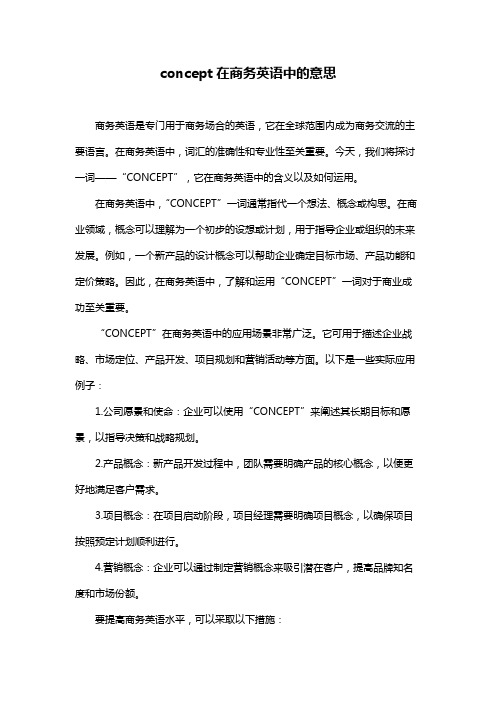
concept在商务英语中的意思商务英语是专门用于商务场合的英语,它在全球范围内成为商务交流的主要语言。
在商务英语中,词汇的准确性和专业性至关重要。
今天,我们将探讨一词——“CONCEPT”,它在商务英语中的含义以及如何运用。
在商务英语中,“CONCEPT”一词通常指代一个想法、概念或构思。
在商业领域,概念可以理解为一个初步的设想或计划,用于指导企业或组织的未来发展。
例如,一个新产品的设计概念可以帮助企业确定目标市场、产品功能和定价策略。
因此,在商务英语中,了解和运用“CONCEPT”一词对于商业成功至关重要。
“CONCEPT”在商务英语中的应用场景非常广泛。
它可用于描述企业战略、市场定位、产品开发、项目规划和营销活动等方面。
以下是一些实际应用例子:1.公司愿景和使命:企业可以使用“CONCEPT”来阐述其长期目标和愿景,以指导决策和战略规划。
2.产品概念:新产品开发过程中,团队需要明确产品的核心概念,以便更好地满足客户需求。
3.项目概念:在项目启动阶段,项目经理需要明确项目概念,以确保项目按照预定计划顺利进行。
4.营销概念:企业可以通过制定营销概念来吸引潜在客户,提高品牌知名度和市场份额。
要提高商务英语水平,可以采取以下措施:1.学习专业词汇:掌握商务英语常用词汇,如“CONCEPT”、“STRATEGY”、“MARKETING”等,有助于提高沟通效率。
2.参加商务英语培训课程:专业的商务英语培训课程可以帮助你更好地了解商务场合的语言要求和沟通技巧。
3.阅读商务英语文章:阅读商务英语文章或书籍,可以让你熟悉商务英语的表达方式和语境。
4.多与外国商务人士交流:实际应用商务英语进行交流,是提高商务英语水平的最佳途径。
总之,在商务英语中,“CONCEPT”一词代表着一个初步的设想或计划,它在企业或组织的发展中起着关键作用。
要提高商务英语水平,需要不断学习专业词汇、参加培训课程、阅读相关资料并与外国商务人士交流。
concept和reference的例子

concept和reference的例子
在学术写作中,概念(Concept)和参考文献(Reference)是其中两个重要的元素。
概念指的是创造性思维的产物,是对事物、现象或观点的抽象概括和理解,而参考文献是对所参考的文献资料的引用和列举。
举一个概念的例子,我们可以考虑“社会责任感”这个概念。
社会责任感可以定义为个人或组织对社会问题承担责任的意识和行动。
在学术写作中,可以通过对社会责任感的定义、特征和影响等方面进行深入研究。
通过概念的引用和阐述,我们能够更好地理解和解释这个概念,并将其应用于相关领域。
参考文献的例子是在学术论文或研究报告中引用的文献资料。
参考文献的作用是为了支持和证明所提出的观点和研究成果的可靠性。
例如,在一篇关于环境污染对健康的研究中,研究人员可能会引用过去的研究、科学报告或相关政策文件作为参考文献。
通过引用可靠的参考文献,读者可以追溯并确认研究的依据和可信度。
要注意的是,引述的参考文献应该来源于权威和可信的出版物,如学术期刊、书籍或政府机构发布的报告。
在学术写作中,正确引用参考文献的格式也是非常重要的,通常遵循特定的引用规范,如APA、MLA或Chicago等。
总结起来,概念和参考文献是学术写作中不可或缺的组成部分。
通过清晰阐述和定义概念,研究人员能够深入探索和解释特定的主题。
同时,正确引用和列举参考文献可以增加研究的可信度和可靠性。
初中英语常用同义词辨析(56)

初中英语常用同义词辨析(56)初中英语常用同义词辨析(56)idea, concept, conception, thought, notion, impression这些名词均有思想、观点、观念之意。
idea : 最普通常用词,几乎适用于任何方面的思维活动。
concept : 指从众多实例中通过概括、归纳而形成的对事物本质、全貌及其内部联系的概念或看法。
conception : 通常指个人或一些人所持有的具体概念或念头,也可指概念的形成过程,含一定的想象和感情色彩意味。
thought : 指以推理、思考等智力活动为基础的心理思维活动及其结果。
notion : 指的是一种模糊的,变化的莫测的想法,无可靠的基础,未经深思熟虑的观点。
impression : 指外部刺激在思想中所产生的印象。
identify, recognize, make out这些动词均含认出,识别之意。
identify : 指辨别、确定人的身份或物品的归属等。
recognize : 指所辨认的人或物多是以前所熟悉的。
make out : 通常指通过人的感觉器官来辨别事物。
idle, lazy这两个形容词均有闲散,懒惰之意。
idle : 通常指不忙,无事可干,一般不含应责备之意。
lazy : 指好逸恶劳,贪闲偷懒,或不愿学习或工作等,常含应受责备之意。
if, whether这两个连接词均含是否之意。
if : 作是否解时,多用于口语,引出宾语从句,不能直接跟or not连用。
whether : 多用于书面语中,可与or或or not连用,除引出宾语从句外,还可引出主语从句、表语从句、同位语从句或与不定式连用。
ignorant, illiterate这两个形容词均可表示无知的之意。
ignorant : 指一般的无知或指不知道某个具体的事。
illiterate : 指不识字的人或没有文化的人。
ill, sick这两个形容词均有生病的之意。
中考英语知识点--初中英语常用同义词辨析(57)
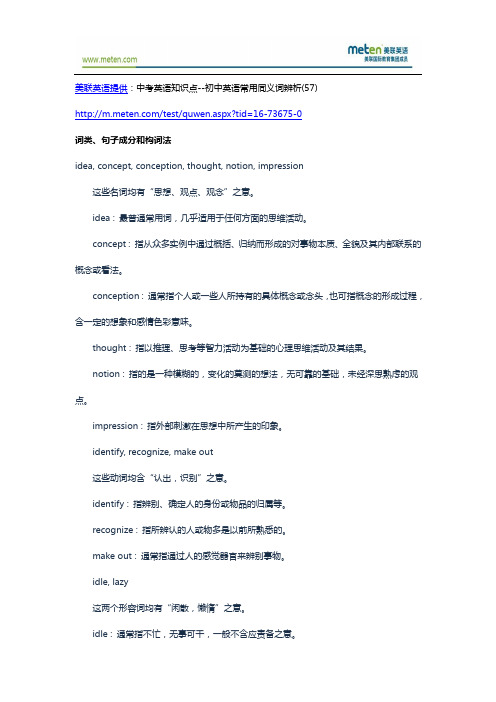
美联英语提供:中考英语知识点--初中英语常用同义词辨析(57)词类、句子成分和构词法idea, concept, conception, thought, notion, impression这些名词均有“思想、观点、观念”之意。
idea : 最普通常用词,几乎适用于任何方面的思维活动。
concept : 指从众多实例中通过概括、归纳而形成的对事物本质、全貌及其内部联系的概念或看法。
conception : 通常指个人或一些人所持有的具体概念或念头,也可指概念的形成过程,含一定的想象和感情色彩意味。
thought : 指以推理、思考等智力活动为基础的心理思维活动及其结果。
notion : 指的是一种模糊的,变化的莫测的想法,无可靠的基础,未经深思熟虑的观点。
impression : 指外部刺激在思想中所产生的印象。
identify, recognize, make out这些动词均含“认出,识别”之意。
identify : 指辨别、确定人的身份或物品的归属等。
recognize : 指所辨认的人或物多是以前所熟悉的。
make out : 通常指通过人的感觉器官来辨别事物。
idle, lazy这两个形容词均有“闲散,懒惰”之意。
idle : 通常指不忙,无事可干,一般不含应责备之意。
lazy : 指好逸恶劳,贪闲偷懒,或不愿学习或工作等,常含应受责备之意。
if, whether这两个连接词均含“是否”之意。
if : 作“是否”解时,多用于口语,引出宾语从句,不能直接跟or not连用。
whether : 多用于书面语中,可与or或or not连用,除引出宾语从句外,还可引出主语从句、表语从句、同位语从句或与不定式连用。
ignorant, illiterate这两个形容词均可表示“无知的”之意。
ignorant : 指一般的无知或指不知道某个具体的事。
illiterate : 指不识字的人或没有文化的人。
概念用英语怎么说

概念用英语怎么说概念是抽象的、普遍的想法、观念或充当指明实体、事件或关系的范畴或类的实体。
在它们的外延中忽略事物的差异,把这些外延中的实体作为同一体而去处理它们,所以概念是抽象的。
它们等同的适用于在它们外延中的所有事物,所以它们是普遍的。
那么你知道概念用英语怎么说吗?下面来学习一下吧。
概念英语说法1:concept概念英语说法2:notion概念英语说法3:idea概念的相关短语:概念图concept map ; 概念地図; Schéma conceptuel ; concept mapping概念艺术Art conceptuel; Conceptual art概念论Conceptualism; Conceptualisme ; conceptualism概念模型conceptual model; Concept models ; Conceptual Data Model偷换概念strawperson ; Homme de paille ; straw man ;different concepts自我概念self concept ; concept ; self-conception ; concept of the self概念模式conceptual schema ; conceptual model ; conceptual level ; concept model概念结构conceptual structure ; concept structure ; conceptual framework ; central conceptual structure 设计概念design concept ; Concept Diagram ; Concept ; design conception概念的英语例句:1. The functionalist model of industrial society was subjected to conceptual criticism.工业社会的实用主义模型在概念上遭到了批判。
概念的反义词_概念的近义词_概念的词语解释

概念的反义词_概念的近义词_概念的词语解释
“概念”的近义词
观点观念
“概念”的反义词
“概念”相关近义词反义词的解释
观念: guān/guàn niàn①思想意识破除旧的传统~。
②客观事物在人脑里留下的概括的形象(有时指表象)。
观点: guān/guàn diǎn①观察事物时所处的位置或采取的态度生物学~丨纯技术~。
②专指政治观点没有正确的立场,就不会有正确的~。
概念: gài niàn思维的基本形式之一,反映客观事物的一般的、本质的特征。
人类在认识过程中,把所感觉到的事物的共同特点抽出来,加以概括,就成为概念。
比如从白雪、白马、白纸等事物里抽出它们的共同特点,就得出‘白’的概念。
concept用法
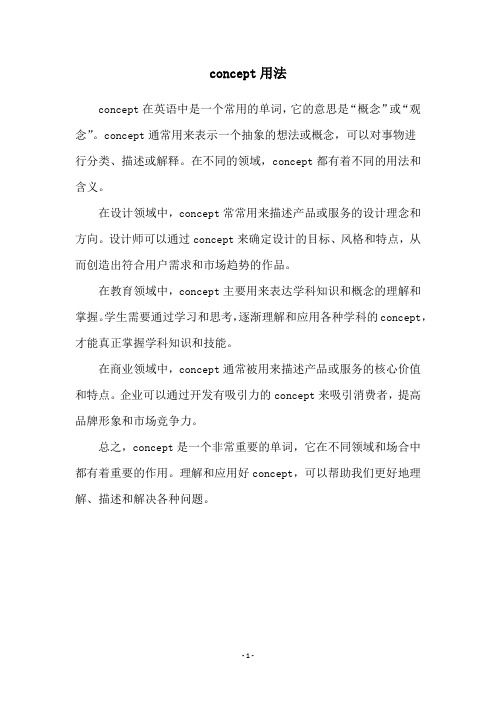
concept用法
concept在英语中是一个常用的单词,它的意思是“概念”或“观念”。
concept通常用来表示一个抽象的想法或概念,可以对事物进
行分类、描述或解释。
在不同的领域,concept都有着不同的用法和含义。
在设计领域中,concept常常用来描述产品或服务的设计理念和方向。
设计师可以通过concept来确定设计的目标、风格和特点,从而创造出符合用户需求和市场趋势的作品。
在教育领域中,concept主要用来表达学科知识和概念的理解和掌握。
学生需要通过学习和思考,逐渐理解和应用各种学科的concept,才能真正掌握学科知识和技能。
在商业领域中,concept通常被用来描述产品或服务的核心价值和特点。
企业可以通过开发有吸引力的concept来吸引消费者,提高品牌形象和市场竞争力。
总之,concept是一个非常重要的单词,它在不同领域和场合中都有着重要的作用。
理解和应用好concept,可以帮助我们更好地理解、描述和解决各种问题。
- 1 -。
- 1、下载文档前请自行甄别文档内容的完整性,平台不提供额外的编辑、内容补充、找答案等附加服务。
- 2、"仅部分预览"的文档,不可在线预览部分如存在完整性等问题,可反馈申请退款(可完整预览的文档不适用该条件!)。
- 3、如文档侵犯您的权益,请联系客服反馈,我们会尽快为您处理(人工客服工作时间:9:00-18:30)。
ConceptA.From WikipediaA concept is an abstraction or generalisation from experience or the result of a transformation of existing ideas.The concept is instantiated(reified)by all of its actual or potential instances,whether these are things in the real world or other ideas. Concepts are treated in many if not most disciplines both explicitly,such asin linguistics,psychology,philosophy,etc.,and implicitly,such asin mathematics,physics,etc.In informal use the word concept often just meansany idea,but formally it involves the abstraction component.When the mind makes a generalization such as the concept of tree,it extractssimilarities from numerous examples;the simplification enables higher-levelthinking.In metaphysics,and especially ontology,a concept is a fundamental category of existence.In contemporary philosophy,there are at least three prevailing ways to understand what a concept is:∙Concepts as mental representations,where concepts are entities that exist in the brain(mental objects)∙Concepts as abilities,where concepts are abilities peculiar to cognitive agents (mental states)∙Concepts as Fregean senses(see sense and reference),where concepts are abstract objects,as opposed to mental objects and mental states Embodied contentMain article:Embodied cognitionIn cognitive linguistics,abstract concepts are transformations of concrete concepts derived from embodied experience.The mechanism of transformation is structural mapping,in which properties of two or more source domains are selectively mapped onto a blended space(Fauconnier&Turner,1995;see conceptual blending).A common class of blends are metaphors.Abstract objectsMain article:Abstract objectIn a platonist theory of mind,concepts are construed as abstract objects.This debate concerns the ontological status of concepts–what they are really like.In the simplest terms,a concept is a name or label that regards or treats an abstraction as if it had concrete or material existence.I t is important to realizethat a concept is merely a symbol,a representation of the abstraction.The word is not to be mistaken for the thing.For example,the word"moon"(a concept)is not the large,bright,shape-changing object up in the sky,but only represents that celestial object.Concepts are created(named)to describe,explain and capture reality as it is known and understood.A priori conceptsMain articles:A priori and a posteriori and Category(Kant)Kant declared that human minds possess pure or a priori concepts.Instead of being abstracted from individual perceptions,like empirical concepts,they originate in the mind itself.He called these concepts categories,in the sense of the word that means predicate,attribute,characteristic,or quality.But these pure categories are predicates of things in general,not of a particular thing.He called those concepts that result from abstraction"a posteriori concepts"(meaning concepts that arise out of experience).An empirical or an a posteriori concept is a general representation (Vorstellung)or non-specific thought of that which is common to several specific perceived objects(Logic,I,1.,§1,Note1)A concept is a common feature or characteristic.Kant investigated the way that empirical a posteriori concepts are created.The logical acts of the understanding by which concepts are generatedas to their form are:parison,i.e.,the likening of mental images to one another inrelation to the unity of consciousness;2.reflection,i.e.,the going back over different mental images,howthey can be comprehended in one consciousness;and finally3.abstraction or the segregation of everything else by which themental images differ...In order to make our mental images into concepts,onemust thus be able to compare,reflect,and abstract,forthese three logical operations of the understanding areessential and general conditions of generating anyconcept whatever.OntologyMain article:OntologyPlato was the starkest proponent of the realist thesis of universal concepts.By his view,concepts(and ideas in general)are innate ideas that were instantiations of a transcendental world of pure forms that lay behind the veil of the physical world.In this way,universals were explained as transcendent objects.Main article:Mental representationIn a physicalist theory of mind,a concept is a mental representation,which the brain uses to denote a class of things in the world.This is to say that it is literally,a symbol or group of symbols together made from the physical material of the brain. Concepts are mental representations that allow us to draw appropriate inferences about the type of entities we encounter in our everyday lives.Concepts do not encompass all mental representations,but are merely a subset of them.The use of concepts is necessary to cognitive processes suchas categorization,memory,decision making,learning,and inference.Classical theoryMain article:DefinitionismThe classical theory of concepts,also referred to as the empiricist theory of concepts, is the oldest theory about the structure of concepts(it can be traced back to Aristotle), and was prominently held until the1970s.The classical theory of concepts says that concepts have a definitional structure.Adequate definitions of the kind required by this theory usually take the form of a list of features.These features must have two important qualities to provide a comprehensive definition.Features entailed by the definition of a concept must be both necessary and sufficient for membership in the class of things covered by a particular concept.A feature is considered necessary if every member of the denoted class has that feature.A feature is considered sufficient if something has all the parts required by the definition.Another key part of this theory is that it obeys the law of the excluded middle,which means that there are no partial members of a class,you are either in or out.Prototype theoryMain article:Prototype theoryPrototype theory says that concepts specify properties that members of a class tend to possess,rather than must possess.Wittgenstein describes the relationship between members of a class as family resemblances.There are not necessarily any necessary conditions for membership,a dog can still be a dog with only three legs. This view is particularly supported by psychological experimental evidence for prototypicality effects.We can judge an item's membership to the referent class of a concept by comparing it to the typical member–the most central member of the concept.If it is similar enough in the relevant ways,it will be cognitively admitted as a member of the relevant class of entities.Rosch suggests that every category is represented by a central exemplar which embodies all or the maximum possible number of features of a given category.Theory-theoryThis theory postulates that categorization by concepts is something like scientific theorizing.Concepts are not learned in isolation,but rather are learned as a part of ourexperiences with the world around us.In this sense,concepts'structure relies on their relationships to other concepts as mandated by a particular mental theory about the state of the world.According to the theory of ideasthesia(or"sensing concepts"),activation of a concept may be the main mechanism responsible for creation of phenomenal experiences.Therefore,understanding how the brain processes concepts may be central to solving the mystery of how conscious experiences(or qualia)emerge within a physical system e.g.,the sourness of the sour taste of lemon.This question is also known as the hard problem of consciousness.Research on ideasthesia emerged from research on synesthesia where it was noted that a synesthetic experience requires first an activation of a concept of the ter research expanded these results into everyday perception.B.From Sci-tech encyclopediaConcept1.International Dictionary of Psychoanalysis|2005|Luzes,PedroCOPYRIGHT2005Thomson Gale.For Wilfred Bion,conception is the result of coupling a pre-conception,an innate a priori idea,and a realization,elements of the real that are provided by external-sensory or internal-emotional experience.The concept is derived from conception through abstraction and nguage and the attribution of a name to a concept unite preconception and realization,preventing any loss of experience in the process.Bion considers the concept a conception that has been assigned a name.The concept signifies a growth of the abstraction that enables us to expand the generalization of psychoanalytic theories,which,as a whole are judged to be too descriptive,too concrete.Concepts can be articulated in a deductive scientific system that functions like an Ars combinatoria2.The Oxford Pocket Dictionary of Current English|2009©The Oxford Pocket Dictionary of Current English2009,originally published by Oxford University Press2009.con·cept/ˈkänˌsept/•n.an abstract idea;a general notion:the concept of justice.∎a plan or intention;a conception:the center has kept firmly to its originalconcept.∎an idea or invention to help sell or publicize a commodity:a new concept in corporate hospitality.∎Philos.an idea or mental picture of a group or class of objects formed by combining all their aspects.∎[as adj.](of a car or other vehicle) produced as an experimental model to test the viability of new design features.C.British Dictionary definitions for conceptnoun1.an idea,esp an abstract idea:the concepts of biology2.(philosophy)a general idea or notion that corresponds to some class of entities andthat consists of the characteristic or essential features of the class3.(philosophy)a.the conjunction of all the characteristic features of somethingb.a theoretical construct within some theoryc.a directly intuited object of thoughtd.the meaning of a predicate4.(modifier)(of a product,esp a car)created as an exercise to demonstrate thetechnical skills and imagination of the designers,and not intended for massproduction or saleWord Origin and History for conceptn.1550s,from Medieval Latin conceptum"draft,abstract,"in classical Latin"(a thing) conceived,"from concep-,past participle stem of concipere"to take in"(see conceive).In some16c.cases a refashioning of conceit(perhaps to avoidnegative connotations).D.From Britannica encylopedia1.concept,in the Analytic school of philosophy,the subject matter of philosophy,which philosophers of the Analytic school hold to be concerned with the salientfeatures of the language in which people speak of concepts at issue.Concepts are thus logical,not mental,entities.A typical instance of the use of concept is in The Concept of Mind(1949)by Gilbert Ryle,an Oxford Analyst,which implies that the purpose of the author is not to investigate matters of fact empirically(i.e.,by themethods of psychology)about the mind itself but to investigate its“logicalgeography.”Similarly,investigation...(100of138words)DictionarytheA semanticallyF.From Collins English Dictionarynoun1.an idea,esp an abstract idea⇒the concepts of biology2.philosophy a general idea or notion that corresponds to some class of entities and that consists of the characteristic oressential features of the class3.philosophy a.the conjunction of all the characteristic features of somethingb.a theoretical construct within some theoryc.a directly intuited object of thoughtd.the meaning of a predicate4.(modifier)(of a product,esp a car)created as an exercise to demonstrate the technical skills and imagination of thedesigners,and not intended for mass production or sale.。
